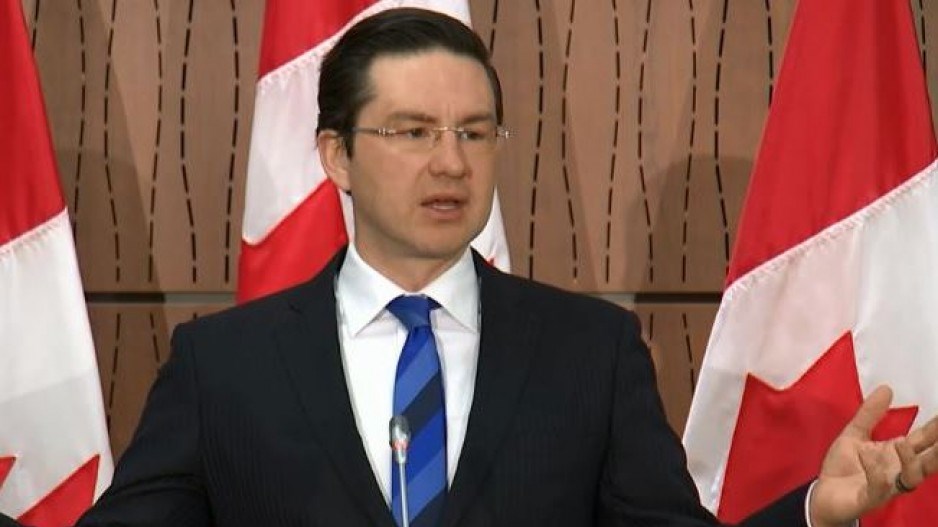Pierre Poilievre and David Eby have a lot in common in their plans to address British Columbia’s housing market.
It’s just that neither of them wants to actually say that out loud.
The man who might be Canada’s next prime minister visited Vancouver the last few days, where he studiously avoided much reference to the man who will be С����Ƶ’s next premier.
Instead, Poilievre, the leader of the federal Conservatives, met with С����Ƶ Liberal leader Kevin Falcon, tweeting on social media that: “Let’s remove the gatekeepers, build more houses, and restore the dream of homeownership for people here in С����Ƶ & across Canada.”
In an interview with Glacier Media, Poilievre said he wasn’t familiar with Eby’s detailed housing platform, which the premier-designate dropped while running for the leadership of the С����Ƶ NDP in September.
“I haven’t read all of his plans,” said Poilievre. “All I know is that in С����Ƶ, the municipal, Vancouver and the provincial governments have done a horrible job on housing.
“They have restricted building and made this one of the most expensive places to get permits.… We need a big reversal in С����Ƶ, and my federal policies will require any city that wants more infrastructure money to speed up and lower the cost of building permits.”
Eby and Poilievre broadly see eye-to-eye on housing, even though they are on far opposite ends of the political spectrum.
Both want to make new transit funding from С����Ƶ and Ottawa contingent on municipalities agreeing to increase density along the routes. Both have threatened to withhold higher levels of financial support from municipalities that fail to meet their housing targets. Both have promised to overrule slow-moving municipal zoning processes (Poilievre calls them “gatekeepers”). And both plan to review the holdings of provincial and federal land to see if underused public space can be developed into affordable housing.
Poilievre proposes $10,000 bonuses for each home a municipality builds above its annual housing targets. Eby simply says they’ll get “rewarded,” while lagging cities will face “provincial intervention to meet growth demands.”
Eby does go further in certain areas: A С����Ƶ Builds fund to kickstart construction, $500 million to buy up and preserve rental buildings, an anti-flipping tax, provincewide legalization of secondary suites and automatic upzoning of single family lots to allow for triplexes in urban areas.
But broadly speaking, they are in closer alignment on housing than any federal and provincial leader before them.
“I’ll work with anyone to make it possible for our young people to own a home,” said Poilievre.
There’s not much political upside for each of them to acknowledge their similarities until, or if, they have to find a way to work together as prime minister and premier.
But Poilievre, like Eby, recognizes the votes to be swayed in the Lower Mainland by swinging big on affordable housing. Both men in recent speeches appealed to the angry younger generation that can’t afford to either rent or own properties.
“It’s unbelievable how bad things have gotten in such a short time,” said Poilievre.
“It used to be a given, if you worked hard and got a job you could buy a house by the time you were 26 or 27 years old. Now, many are living in their parents’ basements into their late 30s because the dream of homeownership is so far out of reach. My message is: It doesn’t have to be.”
Eby delivered a similar line when unveiling his housing plan Sept. 28.
“If you’re a young person living at home, you want to move out of Mom and Dad’s place, and you can’t find somewhere to go, you wonder, when does my life begin as an adult?” Eby asked.
Both men will be fine-tuning those speaking points in the months ahead, to pick up as much momentum as possible with urban voters squeezed by rising interest rates and inflation.
Poilievre spent several days in Metro Vancouver, his first time back since winning the federal Conservative leadership race in decisive fashion on the first ballot in September.
He spoke at a Free Iran rally on the steps of the Vancouver Art Gallery, attended a cultural media roundtable, celebrated Hindu Heritage Month at Lakshmi Narayan Mandir in Surrey and toured a facility with the Iron Workers union, among other events.
Poilievre also met with the Vancouver Police Union, where he addressed crime and the overdose crisis, promising more funding for police and saying С����Ƶ’s efforts on safe supply and decriminalization have been failures.
“My policy is basically: Redirect resources away from the safe-supply approach, to recovery and treatment,” he said. “We need in-patient treatment and recovery programs that will save the lives of addicts and get them off drugs. That’s the only way.”
Poilievre said the policies of Prime Minister Justin Trudeau have “made the problem significantly worse.”
More than 1,644 people have died of toxic drugs so far this year in the province, putting it on track to surpass the 2,000 mark for the second consecutive year, the С����Ƶ Coroners Service revealed Monday.
“We’re not talking about marijuana here, we're talking about highly lethal drugs that can stop a person's heart, and we’re losing almost 2,000 British Columbians a year to overdoses,” said Poilievre.
“Severe addicts need detox, treatment and recovery, they don’t need more drugs. And our police need more support to restore order on the streets.”
On that front, Poilievre and Eby couldn’t be further apart, with Eby firmly in the camp of expanding safe supply and decriminalization.
But on other key areas like housing, they are surprisingly in lockstep.
We’ll see if they can parlay that into a working relationship one day in the future.
Rob Shaw has spent more than 14 years covering С����Ƶ politics, now reporting for CHEK News and writing for Glacier Media. He is the co-author of the national bestselling book A Matter of Confidence, and a regular guest on CС����Ƶ Radio.





